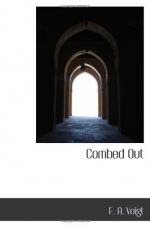Every genuine patriot is called a traitor in his own country. But patriotism, however genuine, is a thing that must be surmounted. There is only one good that war can bring to a nation—defeat. A patriot, loving his own country, would therefore wish his country defeat in war. But he who has surmounted his patriotism and has attained complete impartiality would not selfishly claim the only benefit of war entirely for his own country, but would desire all to share it alike, and would therefore wish defeat for every warring nation.
If a horde of British and a horde of German soldiers engage in mutual butchery, and if the maimed, broken remnants of the British horde have just enough order left to drive back the remnants of the German horde, leaving innumerable dead and wounded and for ever darkening the lives of countless friends and wives—in other words, if the British army wins what our infamous Press would call a “glorious victory”—then all that is evil in the life of the nation is encouraged and justified. It is then that the diplomatists who lied and schemed to bring on the monstrous event, that all the politicians who exploit and foster the nation’s madness and misery to enhance their own reputations, that those who batten on the slaughter, and that those who glorify the carnage at a safe distance and fight the enemy with their lying tongues, are justified. They all are justified. But if, instead of victory, there is defeat, then they tremble lest they should be disgraced and lose their places, lest they should be victims of a disillusioned people’s anger, lest they should forfeit their plunder, lest they should be called to account for the lies with which they fooled the masses. Defeat is the defeat of evil, victory is the victory of evil.
* * * * *
A second batch of papers arrived. The German advance was continuing. The British reverse was becoming catastrophic. At first I felt a kind of grimness, and then I was thrilled by the thought that perhaps the end of the war might be near. We might not have a good peace, but peace of any kind was preferable to war. The mendacious Press talked much about a “dishonourable peace,” as though any peace could be as dishonourable as a prolonged war.
But the immediate reality became too overwhelming. Grey multitudes were sweeping khaki multitudes before them. High-explosives, shrapnel, grenades, bombs, bullets were rending, piercing, and shattering the living flesh and muscle and bone. Towns and villages were being turned into heaps of brick and wreckage. Hordes of old men, women, and children were thronging the roads, and fleeing from approaching disaster.
We went to work as usual although we worked less than usual, for we now had something to talk about. Would the Germans reach the coast? If they did, then the northern armies would be cut off and destroyed. A general retreat from our front might be ordered at any moment. We stood in groups and discussed these problems hour by hour.




